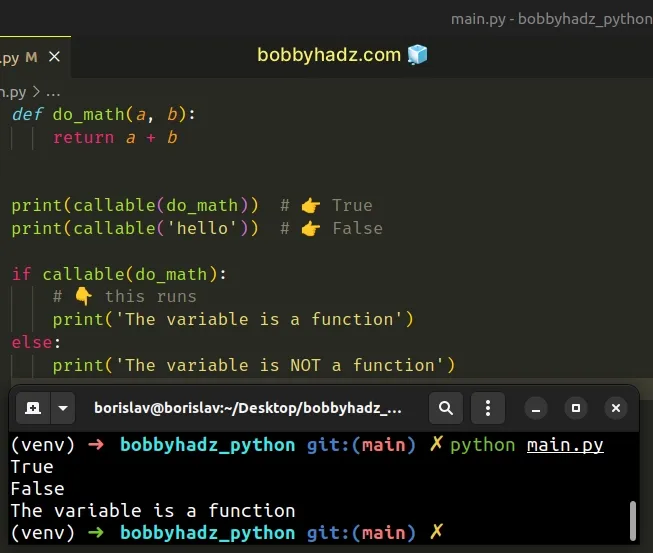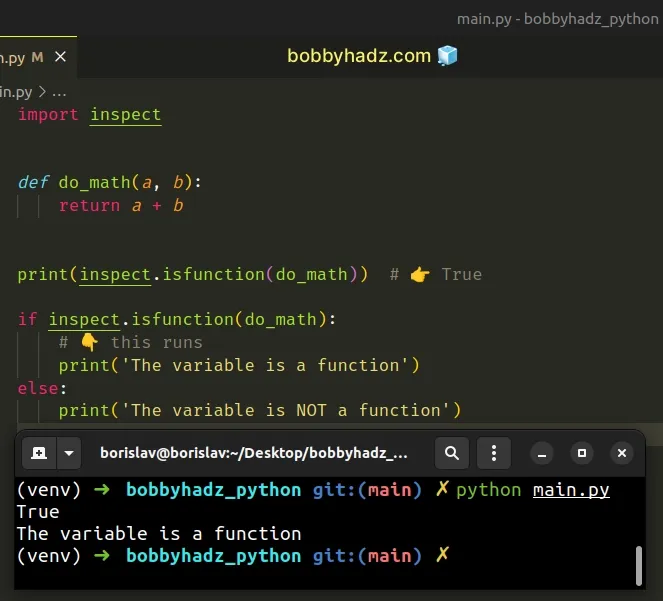How to check if a variable is a Function in Python
Last updated: Apr 10, 2024
Reading time·3 min

# Table of Contents
- Check if a variable is a Function in Python
- Check if a variable is a Function using inspect.isfunction()
- Check if a variable is a Function using types.FunctionType
- Check if a variable is a Function using hasattr()
# Check if a variable is a Function in Python
Use the callable() function to check if a variable is a function, e.g.
if callable(function):.
The callable() function takes an object and returns True if the object is
callable, otherwise, False is returned.
def do_math(a, b): return a + b print(callable(do_math)) # 👉️ True print(callable('hello')) # 👉️ False if callable(do_math): # 👇️ this runs print('The variable is a function') else: print('The variable is NOT a function')

We used the callable() built-in function to check if a variable is a function.
The callable
function takes an object as an argument and returns True if the object appears
callable, otherwise False is returned.
print(callable(lambda x: x * 2)) # 👉️ True print(callable(3.14)) # 👉️ False
If the callable() function returns True, it is still possible that calling
the object fails, however, if it returns False, calling the object will never
succeed.
callable() function doesn't check if the passed-in value is specifically a function, it checks if the value is callable.It also returns True for classes.
class Employee: pass print(callable(Employee)) # 👉️ True print(callable(int)) # 👉️ True
# Check if a variable is a Function using inspect.isfunction()
An alternative approach is to use the inspect.isfunction() method.
The inspect.isfunction() method returns True if the supplied object is a
Python function, otherwise False is returned.
import inspect def do_math(a, b): return a + b print(inspect.isfunction(do_math)) # 👉️ True if inspect.isfunction(do_math): # 👇️ this runs print('The variable is a function') else: print('The variable is NOT a function')

The
inspect.isfunction()
method takes an object and returns True if the object is a Python function.
The method would return False if passed another callable, e.g. a class.
import inspect class Employee: pass print(inspect.isfunction(Employee)) # 👉️ False print(inspect.isfunction(int)) # 👉️ False
True if provided a Python function.The method returns False for most built-in functions because they are
implemented in C, not in Python.
import inspect print(inspect.isfunction(zip)) # 👉️ False print(inspect.isfunction(map)) # 👉️ False print(callable(zip)) # 👉️ True print(callable(map)) # 👉️ True
The zip and map functions are implemented in C, so the
inspect.isfunction() method returned False.
callable function works as expected because it simply checks if the provided object is callable.# Check if a variable is a Function using types.FunctionType
You might also use the types.FunctionType class to check if a variable is a
function.
import types def do_math(a, b): return a + b print(isinstance(do_math, types.FunctionType)) # 👉️ True print(isinstance(zip, types.FunctionType)) # 👉️ False print(isinstance(map, types.FunctionType)) # 👉️ False
However, the class also returns True only for Python functions.
The isinstance() function
returns True if the passed-in object is an instance or a subclass of the
passed-in class.
The types.FunctionType class works in the same way the inspect.isfunction()
method does.
However, the class is a bit more indirect, so there's no good reason to use it.
# Check if a variable is a Function using hasattr()
You can also use the hasattr() function to check if a variable is a function.
def do_math(a, b): return a + b if hasattr(do_math, '__call__'): # 👇️ this runs print('The variable is a function') else: print('The variable is NOT a function') print(hasattr(do_math, '__call__')) # 👉️ True print(hasattr('bobbyhadz.com', '__call__')) # 👉️ False
The hasattr() function takes the following 2 parameters:
| Name | Description |
|---|---|
object | The object we want to test for the existence of the attribute |
name | The name of the attribute to check for in the object |
The hasattr() function returns True if the string is the name of one of the
object's attributes, otherwise False is returned.
If the object has a __call__ attribute then it is callable.
# Additional Resources
You can learn more about the related topics by checking out the following tutorials:
- Call a Function by a String name in Python
- How to call a Function N times in Python
- Run a Function or a Loop only Once in Python
- How to Print the output of a Function in Python
- Why does my function print None in Python [Solved]
- TypeError: Object of type function is not JSON serializable
- TypeError: 'function' object is not subscriptable in Python
- SyntaxError: cannot assign to function call here in Python
- How to use a Variable from another Function in Python
- How to use Function Pointers in Python
- Python: Declaring a Variable without assigning it a Value

